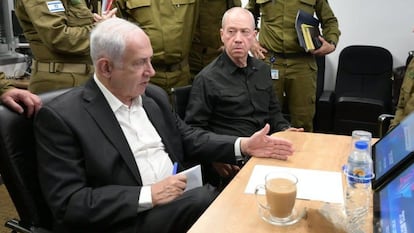Netanyahu forms national unity government before ordering Gaza invasion
Two former Armed Forces chiefs from opposition parties join the war cabinet, while shelling ravages the periphery of the Palestinian strip to pave the way for battle tanks


Israel faces its bloodiest war in 50 years, since the Yom Kippur conflict it almost lost, with a national unity government as of Wednesday. After remaining hidden behind the releases of his press service in the first days after the unexpected Hamas offensive, the conservative Prime Minister Benjamin Netanyahu has stopped dragging his feet and fulfilled the tradition of forming broad-based governments in time of war in the Jewish state.
Two former generals who served as Chiefs of Staff of the Armed Forces and led operations in Gaza, centrist political leaders Benny Gantz and Gadi Eisenkot, join the inner core of the war cabinet. The leader of the opposition, former liberal Prime Minister Yair Lapid, has refused to be part of a grand coalition as long as far-right parties and xenophobic anti-Arab forces remain within it. In principle, Gideon Saar, dissident conservative leader of Netanyahu’s Likud party, is also joining the Executive.
The new national unity government will have one central goal: to avenge the attack by the Islamist militia, which has killed 1,200 Israelis and wounded 2,700 others since Saturday, as well as taking more than a hundred civilians and soldiers hostage. After wiping out Hamas commandos who infiltrated its territory, Israel has launched hundreds of waves of air strikes and artillery barrages against the Palestinian coastal enclave. The bombardments are paving the way for an army ground operation, which analysts in the Israeli press consider inevitable to respond to the unprecedented aggression of the Islamic resistance movement. Both Gantz and Eisenkot steered the course of the 2014 war from the command post.
The Israeli army, which bombed some 200 targets in Gaza during the early hours of Tuesday morning, has deployed 300,000 soldiers to the border with the Strip, according to the Defense Ministry. The delay in the deployment has been criticized in the Hebrew press. “Netanyahu dreamed for years that he was Winston Churchill. Now he is conducting this war like Neville Chamberlain, the Conservative British prime minister who was taken by surprise by World War II,” warned Yediot Ajronot columnist Nadav Eyal. “As happened to Chamberlain, he has not yet come to his senses. More Jews have now been killed in Israel in a single day than any other in recent history,” the analyst added.
The war is already having other political consequences too. Israel’s Interior Ministry announced Wednesday that municipal elections scheduled for October 31 will be postponed indefinitely. The last time elections were postponed in Israel was during the Yom Kippur War in 1973.
For many years, nullifying the military capabilities of Hamas and Islamic Jihad was also the goal of the Israeli invasions in operations Cast Lead (between 2008 and 2009) and Protective Edge (which lasted for more than two months in the summer of 2014). The cycle of violence is now repeating itself, but if in the first of the operations the number of Israeli soldiers killed was limited to nine, in the second it rose to 66. The military wing of the Islamist movement has now shown its strength and level of training by striking mercilessly on Israeli territory in an unprecedented surprise operation carried out in just a few hours. The invasion of Gaza now will not be as easy a mission for the Israeli army as it was 15 years ago. The presence of such a large number of hostages also represents a nightmare for the General Staff’s plans. Netanyahu himself was forced to release a thousand Palestinian prisoners in 2011 in exchange for the release of the soldier Gilad Shalit, who was held hostage by Hamas for five years in Gaza.
So far, the Palestinian Ministry of Health in Gaza has counted 1,055 dead in the fighting and incursions and 5,184 wounded in just four days, which have collapsed Gaza’s hospital system. The same source claims that 60% of the casualties recorded inside the enclave’s territory correspond to women and children. Among the fatalities, there are also seven Palestinian journalists and 11 workers of the United Nations Relief and Works Agency for Palestine Refugees in the Near East (UNRWA).
Forced blackout
Following the announcement of a total blockade of Gaza launched on Monday, the only power plant in the Strip, which was operating at half capacity after being damaged in the 2014 bombardments, has stopped working this Wednesday due to lack of fuel. Since Saturday, Gaza had suffered more than 600 power outages. The enclave, home to 2.3 million people in 365 square kilometers, depends on Israel for electricity supplies, as well as for the import of fuel to power its only plant, but since Saturday it has received neither. Fuel, food, water, and power supplies have been completely cut off since Monday, following Saturday’s attack.
An Israeli bombing attack on the Islamic University of Gaza, the most important in the Strip, has practically destroyed the main campus of the institution, as can be seen in a video broadcast by the Arab television channel Al Arabiya. The X (formerly Twitter) account of the Israeli army confirmed the attack, assuring that “Hamas had transformed an institute of knowledge into an institute of destruction.” The message defines the university as “an important operational, political and military center of Hamas in Gaza” and claims that its facilities served as a “training ground for engineers” of the fundamentalist group.
The number of Palestinians forcibly displaced in the Gaza Strip as a result of Israel’s bombing now stands at 263,934 people, with 175,486 housed in UNRWA schools, according to UN data.
The Egyptian Red Crescent has announced the dispatch of a convoy of humanitarian aid to the Rafah border crossing, which connects the Egyptian Sinai Peninsula with the Gaza Strip, to meet critical cases that need to be transferred across the Egyptian border. Egyptian Red Crescent sources have confirmed to the EFE news agency that they have sent “a convoy of humanitarian aid to the Palestinian land border crossing to receive critical cases that need to be transferred through the Egyptian border,” without giving further details so far.
In the north, Israeli troops and the Shiite Hezbollah militia have exchanged attacks on the Lebanese border. Early Wednesday morning, an Israeli army position stationed near the border was hit by an anti-tank missile from Lebanese territory. Shortly afterward, the Shiite group claimed responsibility for the attack, assuring that it had caused “a large number of casualties.” The Israeli government did not specify whether there had been any deaths in its ranks. The response was swift as Israeli forces shelled positions in southern Lebanon.
Israel has only specified that its unit was attacked near the Bedouin village of Araba Al Aramshe, located on the Israeli side of the border, opposite the Lebanese village of Dhayra. The army reported that “the air force has attacked Hezbollah reconnaissance positions in retaliation for firing from across the border.”
So far, the various incidents have resulted in the death of three Hezbollah members, in addition to some casualties in the ranks of the Palestinian Islamic Jihad (PIJ) and the Israeli Army, on the other side of the border, during an infiltration perpetrated from Lebanon by this pro-Iranian movement.
Sign up for our weekly newsletter to get more English-language news coverage from EL PAÍS USA Edition
Tu suscripción se está usando en otro dispositivo
¿Quieres añadir otro usuario a tu suscripción?
Si continúas leyendo en este dispositivo, no se podrá leer en el otro.
FlechaTu suscripción se está usando en otro dispositivo y solo puedes acceder a EL PAÍS desde un dispositivo a la vez.
Si quieres compartir tu cuenta, cambia tu suscripción a la modalidad Premium, así podrás añadir otro usuario. Cada uno accederá con su propia cuenta de email, lo que os permitirá personalizar vuestra experiencia en EL PAÍS.
¿Tienes una suscripción de empresa? Accede aquí para contratar más cuentas.
En el caso de no saber quién está usando tu cuenta, te recomendamos cambiar tu contraseña aquí.
Si decides continuar compartiendo tu cuenta, este mensaje se mostrará en tu dispositivo y en el de la otra persona que está usando tu cuenta de forma indefinida, afectando a tu experiencia de lectura. Puedes consultar aquí los términos y condiciones de la suscripción digital.








































